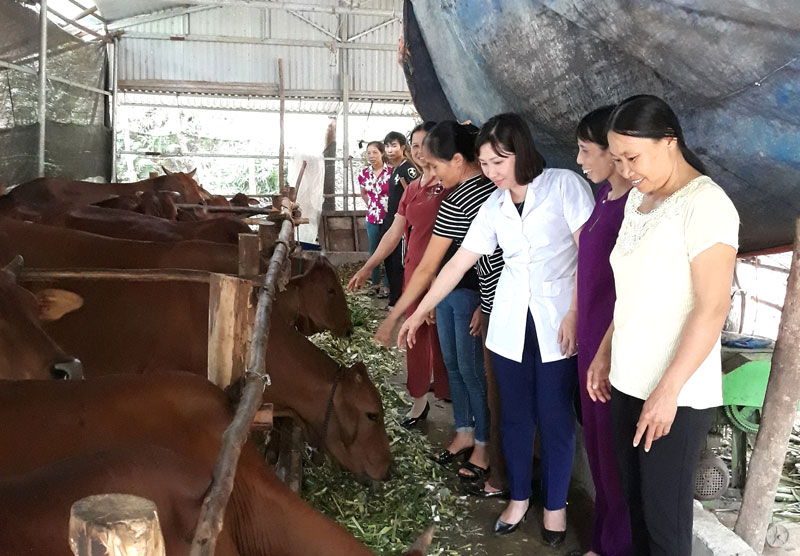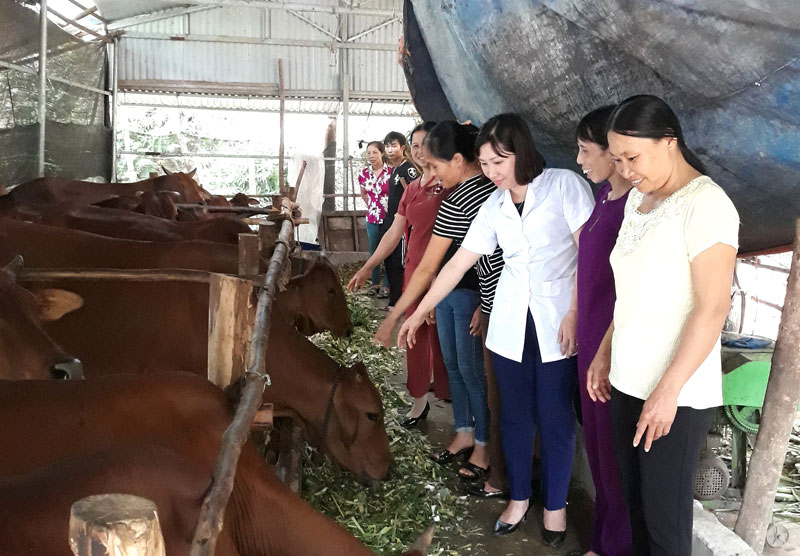
(HBO) – The year of 2018 is an important milestone marking the time of 25 years (1993 - 2018) of the agricultural encouragement system.

In 2018, the Provincial Agricultural Encouragement Center continued to
implement effectively the fattening cow model in My Hoa and Kim Tien communes
(Kim Boi district).
In parallel with the direction of production, the Provincial Agricultural
Encouragement Center has always focused on building models, in 2018, the Center
implemented 9 demonstration models. In which, there are 4 models of
agricultural encouragement with the total cost of over 1,230 million VND,
including: the model of raising fish in cages (200 m3 with 4 participating
households); raising cow to achieve high productivity, quality and efficiency
(with the scale of 205 cows with 70 households involved); raising high quality
honey bees in households (with the scale of 200 litters with 10 participating
households); building and developing the model of synchronous application of
advanced technology in fast growing large timber plantations (36 hectare scale
with 20 households). 5 provincial-level agricultural encouragement models
include: Raising indigenous pigs is implemented in Pa Co commune (Mai Chau
district) with 20 participating households; Improving goat herd in the
direction of meat specialization is implemented in Cao Duong and Tan Thanh
communes (Luong Son district) with 48 households participating; raising
indigenous pigs is carried out in Pu Bin and Noong Luong communes (Mai Chau
district) with 30 households participating; The model of synchronous application
of technical advances in intensive farming of pomelo in the direction of
VietGAP is implemented in Bac Son commune (Kim Boi district) with 10 households
participating; the model of planting and intensifying red pomelo trees is
implemented in Do Nhan commune (Tan Lac district) with 15 households
participating. The total cost of implementing these models is about 729 million
VND.
In addition, the Center cooperates with the Forest Industry Research
Institute (belonging to Vietnam Forestry Science Institute) to develop and
transfer techniques of drying, preserving and processing molds on rattan and
bamboo materials for handicraft villages.
According to data from the Hoa Binh Provincial Party Committee, the industrial production index for the first six months of 2025 is estimated to have increased by 20% compared to the same period last year. This marks the highest year-on-year growth rate for this period since 2020.
In the first six months of 2025, Hoa Binh province’s export turnover was estimated at 1.145 billion USD, marking an 18.11% increase compared to the same period in 2024. Import turnover was estimated at $ 804 million, a 17.15% increase, which helped the province maintain a positive trade balance.
The lives of the ethnic minority farmers in Tan Lac district have gradually improved thanks to the new directions in agricultural production. This is a testament to the collective strength fostered through the professional associations and groups implemented by various levels of the district’s Farmers’ Union.
With the motto the "product quality comes first,” after nearly one year of establishment and operation, Muong village’s Clean Food Agricultural and Commercial Cooperative, located in Cau Hamlet, Hung Son Commune (Kim Boi district), has launched reputable, high-quality agricultural products to the market that are well-received by consumers. The products such as Muong village’s pork sausage, salt-cured chicken, and salt-cured pork hocks have gradually carved out a place in the market and they are on the path to obtaining the OCOP certification.
In the past, the phrase "bumper harvest, rock-bottom prices" was a familiar refrain for Vietnamese farmers engaged in fragmented, small-scale agriculture. But today, a new spirit is emerging across rural areas of Hoa Binh province - one of collaboration, organisation, and collective economic models that provide a stable foundation for production.
Maintaining growing area codes and packing facility codes in accordance with regulations is a mandatory requirement for agricultural products to be eligible for export. Recently, the Department of Agriculture and Environment of Hoa Binh province has intensified technical supervision of designated farming areas and packing facilities to safeguard the "green passport" that enables its products to access international markets.



